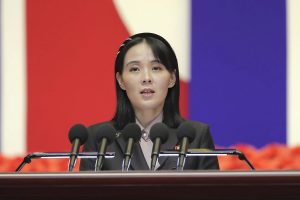North Korea has taken some unprecedented actions of late. Specifically, it has communicated a series of messages to Japan, in which it has maintained its hardline stance on the principle that the Japanese abduction issue has been “resolved.” This is forcing Japanese Prime Minister Kishida Fumio, who is calling for the first Japan-North Korea summit in 20 years, to steer an exceedingly difficult course.
On February 15, Kim Yo Jong, vice department director of the Central Committee of the Workers’ Party of Korea (WPK), delivered a statement to Japan. She had previously issued several statements of condemnation to the United States and South Korea, but this was her first message to Japan. She also issued a statement on March 25, in which she urged Kishida to make a “political decision.” The message was for Japan to let go of the abduction issue so that Japan and North Korea could build a forward-looking relationship.
The North Koreans are surely aware that dropping the abduction issue is a non-starter for the Japanese, so the intended effect is likely to prevent Japan from trying to put pressure on North Korea in cooperation with the United States and South Korea. In other words, Japan must drop the policy of putting “pressure” on North Korea, an approach that had been taken by the administration of former Prime Minister Abe Shinzo.
Another statement to Japan by Kim Yo Jong was communicated on March 26, in which she concluded that “North Korea will pay no attention to and reject any contact and negotiations with Japan. The North Korea-Japan summit is not a matter of concern to North Korea.” These words alone are not sufficient to judge whether this Kim is foreclosing on the possibility of a summit meeting, or whether it is a bargaining attempt to force the Kishida administration to make major concessions. What is certain is that the North Koreans have been angered by the Kishida administration’s unwillingness to make concessions, even after North Korean leader Kim Jong Un sent a condolence message on January 5 in the wake of the 2024 Noto Peninsula Earthquake, hoping to catch the Japanese government’s eye.
A statement in the name of Foreign Minister Choe Son Hui was also released on March 29. On the abduction issue, it said that North Korea has “nothing to solve as regards the ‘abduction issue’ insisted by Japan and, moreover, it has neither the responsibility nor the will to make any effort for it.” Choe added, “The DPRK will not allow any attempt of Japan to contact Pyongyang.” A clear departure from the three statements by Kim Yo Jong, the foreign minister specifically referring to North Korea as its official name, the Democratic People’s Republic of Korea (DPRK) strongly suggests that the future of Japan-North Korea negotiations are grim.
On the same day, North Korea’s ambassador to China, Ri Ryong Nam issued a “position statement.” Revealing that an official from the Japanese embassy in Beijing had proposed “contact through an e-mail to a councillor at [the North Korean] embassy” on the previous day, he stated that “I make it clear once again that the DPRK has no reason to meet with the Japanese side at any level.”
This confirms that the Japanese government has not been engaged in meaningful behind-the-scenes contact with the North Korean side. For more than 20 years, the so-called Japanese Embassy route in Beijing had fundamentally gone through people holding the rank of councillor, but in recent years, the interlocutor has been the Japan School of North Korea’s Ministry of Foreign Affairs. Compared to the behind-the-scenes negotiations that preceded former Japanese Prime Minister Koizumi Junichiro’s visit to North Korea in 2002, this is a superficial channel and is not at all suited to serious diplomacy.
At first glance, all these statements seem to suggest that North Korea is refusing to negotiate with Japan. However, if it were truly not interested in talking, Pyongyang could just ignore Tokyo altogether, without issuing any statements. This is, after all, what it did in the past. So we should rather interpret these statements as North Korea pressuring Kishida to make the largest possible concessions. North Korea’s messages to Abe contained abusive language; in contrast, even at this stage, the statements to Kishida retain a minimum of courtesy.
One very noticeable feature of Kim’s regime is that it can be obsessed with a specific issue, but then suddenly shift attention. With that in mind, without a prompt change in policy direction by Kishida, the chances of the first summit meeting in 20 years could well evaporate.
For his part, Kishida is struggling with very low approval ratings, as the public becomes increasingly aware of the negative aspects of what had been a very proudly long-lived Abe administration. The Japanese prime minister needs to draw a sharp contrast with his predecessor, and one way to do so is with North Korea policy.
Of course, if Japan and North Korea are to overcome this extreme mistrust – a situation that has persisted for many years now – North Korea will need to change its approach as well. No matter what statements are released by North Korea’s foreign minister or Kim Yo Jong, the only one able to shift policy is Kim Jong Un himself. It was his father and predecessor as North Korean leader, Kim Jong Il, whom Koizumi got to admit to and apologize for the abductions.
The abduction issue arose before Kim was born, and as such it is an unfortunate legacy he has inherited from his father. The question for Kishida is whether he can part ways with the former Abe administration, while persuading Kim to also move forward.































